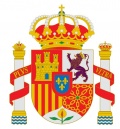Serinyà: Difference between revisions
Jump to navigation
Jump to search
Knorrepoes (talk | contribs) m (Text replacement - ".jpg|center]] ====Official blazon====" to ".jpg|center|Escudo de {{PAGENAME}}]] ===Official blazon===") |
Knorrepoes (talk | contribs) m (Text replacement - "====Origin/meaning====" to "===Origin/meaning===") |
||
| Line 11: | Line 11: | ||
Escut caironat: d'atzur, un sautor o creu de Sant Andreu plena d'argent; ressaltant sobre el tot un bàcul d'abat de gules posat en pal. Per timbre una corona mural de poble. | Escut caironat: d'atzur, un sautor o creu de Sant Andreu plena d'argent; ressaltant sobre el tot un bàcul d'abat de gules posat en pal. Per timbre una corona mural de poble. | ||
===Origin/meaning=== | |||
These arms have been officially granted on 1st June 1983. | These arms have been officially granted on 1st June 1983. | ||
Revision as of 18:15, 22 June 2017
Spanish heraldry portal
This page is part of the Spanish heraldry portal |
Heraldry of the World |
|
Civic heraldry:
|
Other heraldry: |
SERINYÀ
Region : Catalonia
Province : Girona
Official blazon
Escut caironat: d'atzur, un sautor o creu de Sant Andreu plena d'argent; ressaltant sobre el tot un bàcul d'abat de gules posat en pal. Per timbre una corona mural de poble.
Origin/meaning
These arms have been officially granted on 1st June 1983.
The saltire is the attribute of St. Andrew, the local patron saint. The abbot's staff refers to the monastery of Sant Esteve de Banyoles, where the village belonged to.
Contact and Support
Partners:
Your logo here ?
Contact us
© since 1995, Heraldry of the World, Ralf Hartemink 
Index of the site
Literature : Image taken from Wikipedia; background from Enric Fontvila, Barcelona.












